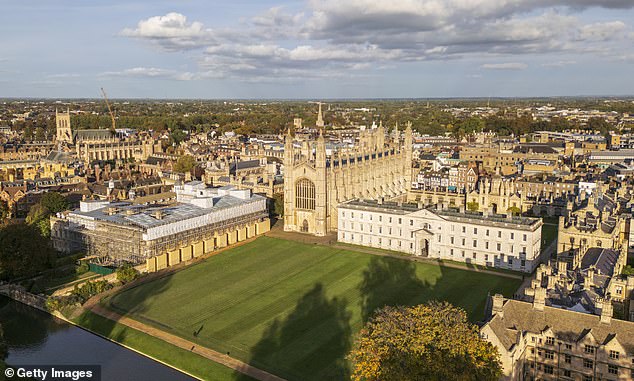All except one of Britain’s five ‘wokest’ universities have fallen down a prestigious rankings league table.
Oxford and Cambridge, once crowned the top two in terms of pushing contentiously progressive ideologies on students, came joint-fourth in The Times and The Sunday Times Good University Guide 2026.
Last year Oxford was ranked third, while Cambridge was already sitting at fourth.
It marked the first time Oxbridge missed out on the top three in the three decades the Times has produced its guide.
Bristol, third in the introductory ‘woke’ list published by think tank Civitas in 2023, was the only one in the top five to climb the Times’ annual table in comparison to 2021. It went up three positions to tenth.
University College London (UCL), meanwhile, dropped one place to ninth. Newcastle fell three slots to 34th.
The Times ranked them on a slew of criteria, including student satisfaction, teaching quality, entry standards, research quality, sustainability and graduate prospects.
Civitas, however, scoured websites, national and local media, and promo materials for examples of ‘campus wokery’ to rank 137 universities on their radical progressivism.
Cambridge came first and Oxford second, after they introduced programmes such as ‘unconscious bias’ and race workshops for freshers, attempted to stick ‘trigger warnings’ on pro-life student stalls and removed historical items with links to slavery.
Bristol even outlawed the word ‘mankind’ to avoid causing offence.
There was no wider correlation between how woke a university was and how it fared on the rankings.
Holding Oxford and Cambridge up as examples, experts think the declining standards could be down to their obsession with social engineering.
Chris McGovern, chairman of the Campaign for Real Education, said the policies have led to a decline in student satisfaction as they tire of the ‘woke tyranny’ that has been infecting areas such as free speech.
He told the Daily Mail: ‘I understand the extremely woke behaviour actually puts some able students off.
‘It’s actually not a surprise to me that they are falling in the ranking.
‘Many very able young people can see through this veneer of wokeism, this veneer of political correctness, and they want something else.’
Mr McGovern, a retired headteacher and former No10 adviser, added: ‘They also know Oxford and Cambridge have a growing reputation for suppressing freedom of speech, so they’re choosing other universities or going abroad.’
Over the past few years, it has become a matter of routine for students to rally against speakers with whom they disagree by protesting in an effort to get them cancelled.

King’s College chapel at the University of Cambridge, which came fourth in the rankings alongside Oxford – following years of concerns about social engineering
Scenes like the Radcliffe Camera in Oxford are iconic in higher education – but standards have been slipping, and it now stands in fourth place
That culture was seen when the president of Oxford’s famous Union, 20-year-old George Abaraonye, made headlines recently when he reportedly posted on WhatsApp: ‘Charlie Kirk got shot, let’s f***ing go’ and added a praying hands ‘thanks’ emoji.
He won his place at the prestigious university with just ABB grades at A-level, despite his course typically requiring a minimum of three A grades.
In addition to the tightening of freedom of speech, Mr McGovern added that their brand image was also being ‘tarnished’ because they are now increasingly accepting students based on diversity metrics – instead of academic success.
He said: ‘At the same time as that’s happening, Oxbridge are looking to enforce equality, diversity, and inclusion as what determines entrance to the university.
‘They’re now accepting young people who would not normally get into those elite places, many of whom are just not good enough. That’s why they’re falling in the rankings.’
The decline of Oxford and Cambridge is historically unprecedented, as the duopoly has dominated Britain’s higher educational institutions for more than one hundred years.
The term ‘Oxbridge’ was coined in 1850 by William Makepeace Thackeray in his novel Pendennis (he briefly attended Trinity College, Cambridge) – and it has always been a byword for the golden ticket to a successful elite career.
A 2019 report by the Sutton Trust and the Social Mobility Commission found 24 per cent of MPs attended Oxbridge, as did 38 per cent of peers, 56 per cent of permanent secretaries, 71 per cent of senior judges and 13 per cent of police chiefs.
Between them, they have produced 198 Nobel prize winners and 45 British prime ministers.

Oxford student George Abaraonye recently sparked uproar with his gloating reaction to the Charlie Kirk shooting. He won his place at the prestigious university with just ABB grades
The widespread success of its students has led to an obsession from parents to get their children to attend, creating a burgeoning industry of expensive tutors and coaches to help with the lengthy application process.
But universities have felt pressure from successive Governments to widen their intake to include more students from deprived backgrounds.
Earlier this year, Universities UK, which represents campus bosses including Oxford and Cambridge, launched an action plan to boost access for the ‘most disadvantaged in society’.
This involved getting more universities to adopt ‘contextual offers’, meaning lowering entry grades for those who had faced ‘barriers’.
These include growing up in care, attending a low-attaining school, or being from a low-income family.
Offers could be up to three grades lower than the standard requirement, even in competitive areas such as medicine.
Other interventions have included universities being provided data on free school meals to help them select the poorest applicants.
Details of this policy emerged three years ago, when statistics showed poor students had enjoyed a better rate of offers for places than their richer peers.
In 2002, 54% of Oxford offers were made to state school applicants, compared with 68% in 2022. Meanwhile at Cambridge, the proportion increased from 55% to 71% over the same period.
One previous president of a Cambridge college said in 2021 that ‘ideally’ the student population would reflect the percentage of pupils at state schools, which is 93%.
Mr McGovern added: ‘The path to hell is paved with good intentions.
‘Oxford and Cambridge have got the heart in the right place, but they’re just deluded, and they’re so wishing to do the right thing that they’re getting, in fact, getting it seriously wrong.
‘Our campaign would applaud the inclusion of bright kids from poorer backgrounds, but the way to do that is not at the age of 18.’
Instead Mr McGovern says the Government needs to create more academic streams and grammar schools where clever pupils can be allowed to stretch themselves prior to university.
One university that has seemingly bucked the trend of an inclusivity-at-all-costs motto is Durham University.
Once jokingly known as the destination for Oxbridge rejects, the third-oldest university in England now ranks above both of its ancient rivals – and was given the prestigious title of University of the Year 2026 by the Times.
It is fiercely competitive to get into, but nevertheless accepted the highest percentage of private school students in 2024.
It is keen not to be seen to discriminate against its private school applicants in the push to be more inclusive.

Bristol University (pictured), third in the ‘woke’ list, was the only one in the top five to climb the Times’ annual table in comparison to 2021
Vice-chancellor Professor Karen O’Brien told the Times: ‘We look at everybody who applies to us.
‘Nobody chooses what background they come from and we look at people in terms of their potential and we look at people in terms of their achievements, and we admit them on that basis.’
Likewise the University of St Andrews, which is known for having a generally international and wealthy student body, also tipped Oxbridge to retain its second-place spot.
The London School of Economics and Political Science (LSE) came top of the Times’ comprehensive guide, which have been produced since 1993.
A Cambridge University spokesman said that it is ranked top for entry standards with a score of 210, which is based on UCAS points for high tariff A-level grades.
They said Cambridge doesn’t operate quotas and has a rigorous admissions process, adding that anyone who secures their place to study there does so on merit.
A spokesman for Oxford University pointed out that it topped the Guardian’s 2026 university ranking.








